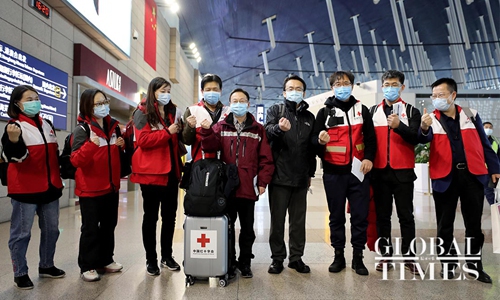
China dispatches a team of nine medical experts to Italy, on Thursday, to help fight the COVID-19 pandemic, along with 31 tons of medical supplies, including ICU ward equipment, protectiveoutfits, and antiviral drugs. Photo: Yang Hui/GT
As China is sending more medical supportive teams to help foreign countries and regions fight against the COVID-19 pandemic, Chinese netizens joked that China's "one province supporting one city" policy to back Hubei was upgraded to "one province supporting one country."
According to media reports, China has already sent medical experts from Shanghai, Sichuan, Jiangsu and Guangdong separately to Iran, Italy, Pakistan and Iraq. Materials have also been donated to many other countries including South Korea and Japan.
On Monday, Chinese Foreign Minister Wang Yi announced that China is planning to send medical experts to the Philippines and Spain, which are in urgent need for medical resources facing a serious epidemic.
Chinese netizens began to guess the origins and destinations of the next batch of medical experts.
Some guess that provinces with foreign sister city relationships may support their sister cities like Jiangsu province and Vaud, Swiss, and Guangzhou, capital of Guangdong province with Fukuoka, Japan.
"Has the 'one province supporting one city' policy been upgraded to 'one province supporting one country?'" some netizen said on social media platforms.
In early February, Chinese authorities dispatched supportive teams from 16 provinces and regions to help the 16 cities in Hubei except Wuhan, which were facing shortage of medical resources to combat COVID-19 epidemic.
When China is gradually improving from the shadow of the epidemic, Chinese netizens said that they are proud of these hero medical workers who are going abroad to help others without a stop right after the local epidemic.
China has received many help from others when the epidemic was severe in the country, and now it is the time to pay back, said the netizens.
When explaining why so many Sichuan medical experts volunteered to go to support Italy, Shen Ji, Sichuan provincial health official said in an interview with the China Central Television that 14 Italian experts helped save more than 900 victims in Mianyang, one of the worst-affected area during the 2008 Wenchuan earthquake that claimed nearly 70,000 lives.
According to media reports, Italy was the first European country that provided support to China after the disastrous earthquake.
"Sichuan residents are always grateful for Italy and want to pay back to them when the latter faces crisis," Shen said.
"We are all in the game of chess, helping others is also helping ourselves," Zeng Guang, chief epidemiologist of the Chinese Center for Disease Control and Prevention, told the Global Times on Monday.
As the situation is gradually easing in China, China now has the ability and is willing to help as long as other countries require, Zeng said, noting that the supportive team should include doctors and epidemiologists with practical experiences.
Besides medical materials like masks and protective suits, the medical team to Italy also has brought the recovered plasma products, which is "really a generous gesture" according to Zeng as the products are rare in China and only used on critical patients.
While some netizens cheered for China's friendly move to help the world, some others noted that people should not to rely on China's support to ensure their win over the epidemic, especially considering that China has suffered seriously.
"Help within our capacity" should be the premise for China to support others, experts said.
"We try our best to provide help, but, after all, the countries and regions could only rely on themselves, on their own policies and governments, to overcome the epidemic," Zeng noted.
The arrangement should also be made according to different provinces and regions' capacities, Zeng noted. Provinces and regions that are well developed may send teams to more than one places overseas while less developed may have difficulty in helping one, he said.



